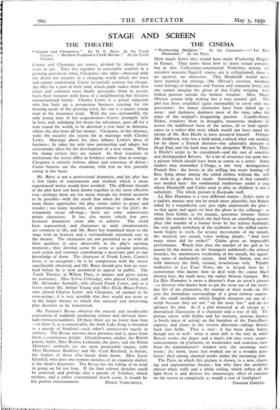STAGE AND SCREEN
THE THEATRE
" Carrie and Cleopatra." By H. E. Bates. At the Torch Theatre. " Herbert Farjeon's Little Revue." At the Little Theatre.
CARRIE and Cleopatra are sisters, divided by about fifteen years in age. They live together in reasonable comfort in a growing provincial town, Cleopatra—the elder—obsessed with the desire for security in a changing world which she fears and cannot understand, Carrie resentfully anxious for change. An offer for a part of their land, which pride makes them first reject and common sense finally persuades them to accept, fuses their fortunes with those of a neighbouring but hitherto unencountered family. Charles Lewis is a genial vulgarian who has built up a prosperous business catering for the housing needs of the growing town, his son is a jaunty young man in the insurance trade. With the son—presumably the only young man of her acquaintance—Carrie promptly falls in love, and, indulging her desire for adventure, goes off for a tour round the world, to be deserted a year later in America, where she also loses all her money. Cleopatra, in her absence, seeks the security she yearns for in marriage with Charles Lewis. Marriage above his class inflates Lewis's ideas of business ; he takes his wife into partnership and adopts her uneconomic ideas for the development of a new estate. When the slump arrives they are ruined. In their reactions to misfortune the sisters differ in boldness rather than in courage. Cleopatra is entirely forlorn, abject and conscious of defeat ; Carrie brazens out the situation, with fear no less patently eating at her heart.
Mr. Bates is not a professional dramatist, and his play has a few faults of construction and method which a more experienced writer would have avoided. The different threads of the plot have riot been drawn together in the most effective way—perhaps there are too many threads for formal neatness to be possible—with the result that when the climax of the main theme approaches the play seems rather to grope and wander ; too many incidents of importance to the plot's de- velopment occur off-stage ; there are some unnecessary minor characters. It has also merits which few pro- fessional dramatists seem able to achieve. The social facts represented, and characters in such circumstances, are common in life, and Mr. Bates has translated them to the stage with an honesty and a verisimilitude extremely rare in the theatre. The characters are not presented to us with all their qualities at once observable in the play's opening moments ; they develop scene by scene as genuine persons, each action and sentence contributing a necessary part to our knowledge of them. The character of Frank Lewis, Carrie's lover, is an exception ; he is by comparison with the others superficially observed, and Mr. Bates should give him an over- haul before he is next permitted to appear in public. The Torch Theatre, in Wilton Place, is minute and gives actors no assistance. Miss Sylvia Coleridge, who played Carrie, and Mr. Alexander Archdale, who played Frank Lewis, and to a lesser extent Mr. Arthur Young and Miss Hilda Bruce-Potter, who played Charles Lewis and Cleopatra, all seemed to be over-acting ; it is very possible that they would not seem so in the larger theatre to which this unusual and interesting play deserves to be transferred.
Mr. Farjeon's Revue observes the ancient and insufferable convention of suddenly producing solemn and elevated inter- ludes between numbers. Of these there are no fewer than four —or three if, as is conceivable, the Irish Lake Song is intended as a parody of Stanford—each other's unnecessary equals in artiness. The Revue survives their presence and is, apart from them, a continuous delight. Glyndebourne, cricket, the British parent, ballet, Miss Beatrix Lehmann, the press, and the Prime Minister's umbrella are the most memorable targets, with Miss Hermione Baddeley and Mr. Cyril Ritchard, as before, the leaders of those who knock them down. Miss Joyce Grenfell, who does one-woman sketches of an exquisite malice, is the show's discovery. The Revue has the failing of its kind in going on far too long. If the four solemn sketches could be removed, and perhaps also a parody of Tchehov, which misfires, and a rather conventional beach scene, it would be














































 Previous page
Previous page